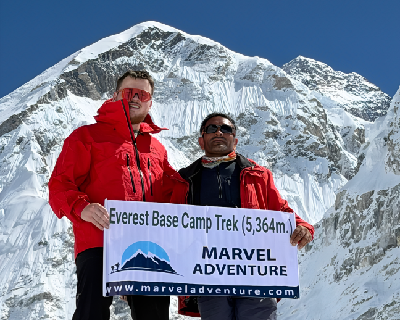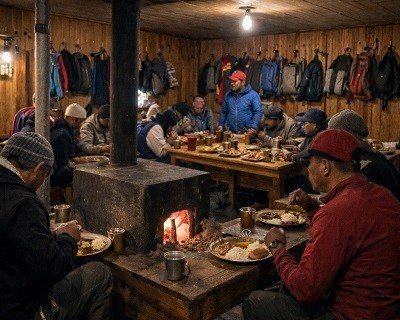Can EBC be done without a professional guide?
The answer to this is a straight NO. You must go for the Everest Base Camp trek with a professional guide. For the trekkers to understand it better, an experienced guide is like the first permit you will need for any trek in Nepal.
Why So?
The Nepal Government and other tourism authorities of Nepal have decided only to let foreign trekkers go on any circuit treks or peak climbs with a professional and experienced guide. This decision is made by keeping the safety of the tourists as the significant and only concern. When any foreigner comes to Nepal with a massive dream of experiencing the mountains, walking the terrain, and feeling the beauty of Nepali nature, the Nepalese and Nepal Governments must ensure their safety and well-being.
Language Issues
Other than that, there are also several other consequences that you might face if you attempt the trial without a professional guide, and one of the major problems might be with the language. Foreign trekkers should remember while trekking in such a remote area that many locals need help understanding languages other than their own. Many people need help understanding the Nepali language. Even if you learn basic Nepali, you might need help communicating with the locals. However, a professional guide can work as a translator between you and the locals in that region.
While navigating the path
Even though you might study the whole trial very deeply before going for the trek, you must remember that you might miss some minor details, impacting your trekking experience. However, a professional guide can solve this problem. They will be known for every step of the trek from the start to the end.
Imagine that you researched the Everest Base Camp one week before going for the hike. Won’t you face difficulty conversing with the locals or even the tea house owners if they need help understanding the Nepali language themselves? The answer is yes; there are maximum chances of this situation occurring. Therefore, professional guides are required during the trek to make the conversation more straightforward, understand the locals, and let them know you.
Why do some trekkers want to avoid guided trek?
While it is not generally advised, some trekkers prefer independent trek to Everest Base Camp for various reasons.
One reason for the Everest Base Camp without a guide could be a desire for independence and self-sufficiency. To challenge themselves and test their abilities, some trekkers prefer to plan and execute their trek without the assistance of a guide. Those with prior trekking and mountain climbing experience may find this a rewarding experience.
Another reason might be a desire to save money. Hiring a guide can be costly, so some trekkers may start deciding to go without one to save money. However, the cost of a manual may be too much for the added safety and assistance they provide.
Some hikers may solo trek for a more genuine and immersive experience. Going without a guide means allowing trekkers to interact with local individuals and groups more directly and experience the trek on their terms. Even though it may sound extraordinary and courageous to go trekking without a guide, trekkers should never make this decision.
Obtaining the EBC trek permits without a guide
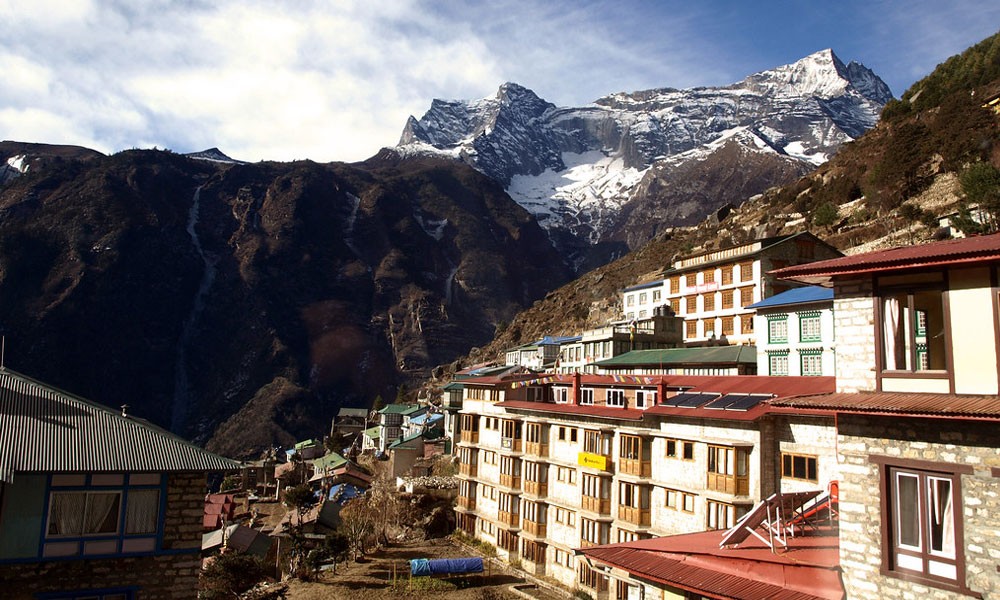
Two permits are needed to attempt the Everest Base Camp: Khumbu Rural Municipality and Sagarmatha National Park Entry Permit. However, tourists can only obtain these permits with a professional trekking guide. As mentioned in the above section, a strict rule against solo trekking has been passed by the Nepal Government and the Nepal tourism authorities.
Besides, guides also have the perfect idea about which offices to visit to obtain the permits. Therefore, if you want to accomplish the Everest Base Camp trek without any hassle regarding the documents and permits, hiring a professional guide would be the perfect idea.
Permit Costs and availability
As mentioned in the above section, the Everest base Camp trek requires a Sagarmatha National Park Entry Permit and Khumbu Rural Municipality. Talking about the price, the Sagarmatha National Park Entry permit will cost you approximately Nepali Rupees 3,000 or $23, and the Khumbu Rural Municipality permit will cost you roughly $20 per person.
You can obtain the Sagarmatha National Park entry permit from Nepal Tourism Board in Kathmandu. Regarding the Khumbu Rural Municipality entry permit, this permit can be obtained after arriving in Lukla.
Besides that, one extra and optional permit is the Gaurishankhar Conservation Area Permit. This permit is only required if you are trekking from Jiri to Everest Base Camp, and its cost is also just NPR 3,000.
Best Time for EBC trek
Are you ready to embark on a fantastic quest to the top of the world? The Everest Base Camp trek is unlike anything else, providing breathtaking views of the Himalayan mountain ranges and the ability to step at the foot of Mount Everest. But before you pack your bags and zip up your walking boots, select the correct time for your trek.
First, we have the autumn months of September to November. This is unquestionably the best moment to trek to Everest Base Camp. The weather and sky are dry and clear, and the trails are much less muddy and slippery. In addition, you'll have the chance to get the ultimate Instagram-worthy shot of the world's highest peak without any sky in the way. The only drawback? Because this is the peak period for the trek, you'll have to share the trails with other daring souls.
If you want to go on a surround-by-trees hike, the winter months of December to February are excellent. Yes, it's cold and snowy, but the snow-covered landscapes provide a serene beauty you didn't believe in any other time of year. Fewer people on the trails will give you more time and space to take in awe-inspiring scenery. Bring plenty of warm layers and hot chocolate.
The spring months ofMarch to May are up after this. The weather is pleasant, the flowers are bursting, and the trails are alive with activity. This is a beautiful time to enjoy the lush greenery of the forests and valleys and learn about the Sherpa people living there. Prepare for mud and slippery terrain as the snow melts, and be prepared to share these same trails with more hikers.
Finally, we have the summer months of June to August. Everest Base Camp might not be the best experience in summer, but it is still an option for those desiring a more adventurous adventure. The monsoon rains and humidity may be problematic. Still, the trails are less crowded, and you'll be able to appreciate the landscapes in a new light. Who does not enjoys a little rain and mud to spice up the journey?
Consequences to face while trekking without a Guide
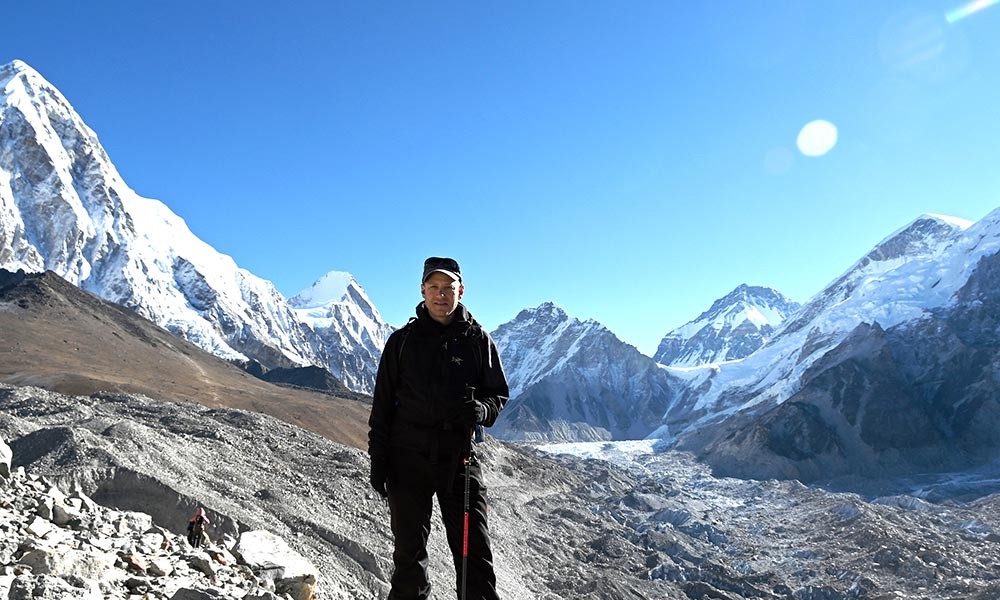
Trekking to Everest Base Camp is a fulfilling and challenging experience requiring careful preparation and planning. One of the most significant decisions trekkers must make is whether or not to hire a guide. While some trekkers choose to go without a guide, this is impossible. Here are some risks of trekking without a professional guide besides going against the government's rules.
Safety Risks
The Everest Base Camp Trek is a breathtaking and high-altitude trek requiring careful planning and preparation. The landscape and altitude can be challenging to get around. Trekkers are likelier to get lost or make mistakes that endanger their safety without a guide. Guides are supposed to teach how to navigate the terrain and recognize potential risks.
They can also provide first aid and emergency assistance in an accident or injury. Without a guide, trekkers may be more vulnerable to altitude sickness, which may be fatal. Guides can assist trekkers in acclimating to the altitude and acknowledging symptoms of altitude sickness before they become severe.
Difficulty in Navigating Route
The Everest Base Camp trek covers a large, remote area that can be difficult to maneuver. There are multiple paths, trails, and routes to choose from, and without a guide, trekkers may battle to find the correct way or forgo, becoming disoriented. Attendants are instructed to navigate the terrain and find the most effective routes.
They can also advise you about important landmarks, rest stops, and other features. Trekkers who need a guide may spend energy and time attempting to find their way or take a more dangerous or challenging route. This increases the likelihood of an accident, harm, or fatigue.
Misconceptions about Culture
Trekking in Nepal is as much a cultural experience as a tangible one. Travelers on the Everest Base Camp trek pass through various communities and regions, each with specific customs, traditions, and languages. Trekkers may need a guide to communicate with locals or understand their practices and businesses. This can cause confusion or even offense. Trekkers can aid guides who can help them navigate cultural differences and provide information about regional customs and traditions.
They can also assist trekkers in having respectful and meaningful interactions with locals, enhancing the cultural experience of the trek. Trekkers who do not have a guide may miss out on this crucial aspect of the expedition and may accidentally offend or lack respect for others.
Limited Resources
A trek to Everest Base Camp necessarily involves the availability of resources such as food, water, shelter, and emergency aid. With a guide, trekkers may be able to find these funds and may have access to them. Guides can advise trekkers on where to find reserves and assist them in gaining admission. As needed, they may offer supplies and equipment. Trekkers who do not have a guide are more susceptible to malnourishment, dehydration, and exposure to the elements. This increases the probability of fatigue, illness, and other health issues.
Lack of Communication and Support
Climbing the Everest Base Camp without a guide can result in a lack of companionship and assistance. Trekkers may find themselves in terms of navigation, language problems, and potential medical emergencies. Trekking without a guide may result in isolation and a lack of community support, exacerbating the mental and physical obstacles of high-altitude trekking.
However, if you are on the trek with a professional guide, you will always be supported, and the guide will provide you with the physical and mental support you require to accomplish the trek easily.
Challenges During the Trek
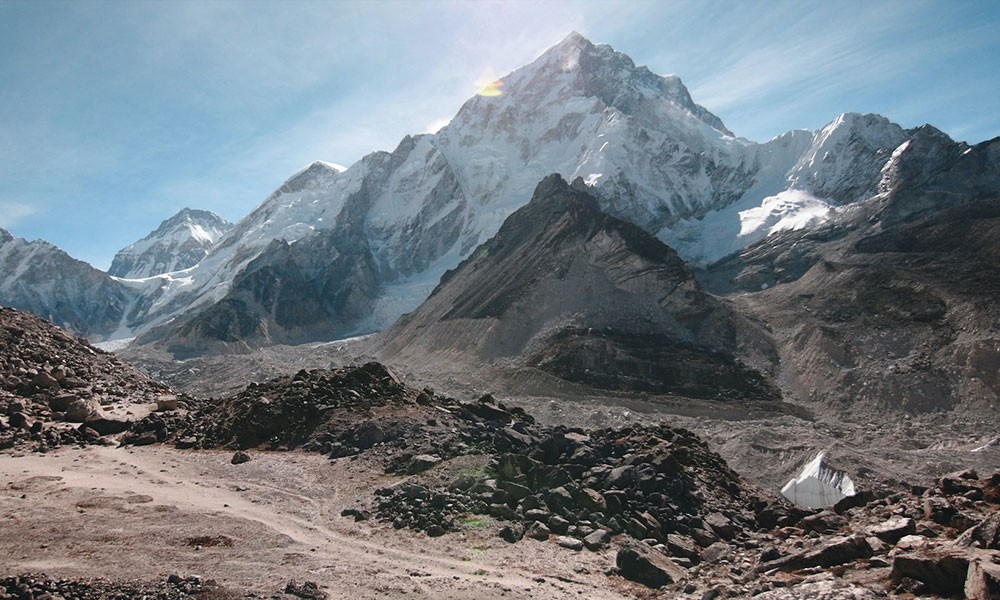
Hiking the Everest Base Camp without a guide is challenging and demanding, and trekkers may face many challenges. Here are a few of the common challenges that backpackers may face whereas trekking to Everest Base Camp:
Altitude Sickness
As trekkers climb higher, the air becomes thinner, and the body may not receive enough oxygen, which results in altitude sickness. Headache, nausea, vomiting, and breathing difficulties are among the symptoms. Hikers must learn to adjust and move up gradually to avoid altitude sickness.
Weather Conditions
The weather in the Everest Base Camp can be unpredictable and harsh, with sudden temperature changes, high winds, and snowfall. Trekkers must be prepared for all kinds of weather, and the trek may be delayed or even canceled in the case of severe weather.
See also:
Physical Fitness
The EBC trek is a challenging trail that includes long hours of walking, steep ascents and descents, and carrying an enormous backpack. Trekkers must be physically fit and practice regularly to prepare for the trek.
Accommodation and sanitation
The teahouses and lodges along the trekking route may have basic amenities such as hot water and sanitation. Trekkers must be prepared for primary living conditions and bring personal hygiene materials.
Crowded Trail
The Everest Base Camp trek is a well-known trekking route. The trail might become congested, especially during the busy trekking season. Trekkers must be patient and respectful towards one another, especially on narrow paths and steep, steep inclines.
Safety Tips
Going for a hike to Everest Base Camp can be a rewarding and challenging experience, but it is also fraught with danger. Following basic safety precautions is critical to ensure a safe and successful trek. Here are a few of the safety tips you should be aware of before going for the tour.
Acclimate properly
Altitude sickness, which can cause headaches, nausea, and dizziness, is a severe risk when trekking to high elevations. To avoid altitude sickness, acclimate slowly and take rest days. The general rule is to climb 300-500 meters daily and rest for every 1000 meters gained.
Stay hydrated and eat well
Proper nourishment and water intake are essential for staying healthy and strong during the trek. Consume plenty of water (at least 3-4 liters daily) and nutrient-dense foods like fruits, vegetables, and whole grains. Avoid alcohol and caffeine, which can donate to dehydration and exacerbate altitude sickness.
Dress appropriately
The weather in this trek can be unexpected and extreme, ranging from below cooling to hot and sunny. Wear layered waterproof, and windproof clothes to stay snug and secure. Bring warm and waterproof gloves, a hat, and a scarf to keep the cold and wind off your head and hands.
Use the proper tools
Trekking equipment of high quality is crucial for a safe and successful trek. Invest in resilient and comfortable hiking boots, a well-fitting and distributed equally backpack, and trekking poles for stability and support. Bring a headlamp or flashlight, a first-aid kit, and a map or GPS device to help you navigate.
Everest Base Camp is located at the lap of the tallest mountain in the world. Therefore, ascents and descents might be challenging if proper gear and clothes are not carried.
Be aware of potential hazards
The trek to Everest Base Camp includes crossing glaciers, steep slopes, and narrow paths, which can be risky. Be mindful of potential dangers and hazards such as falling rocks or ice, crevasses, and avalanches. Follow the advice of experienced guides and porters, and stay alert and focused while trekking.
Why Go with Marvel Adventures?
.jpg)
As you have read the full blog, you might have decided to hire a professional guide from a registered trekking agency. If so, you can trust us for our services and assistance to our clients. Here are some of the reasons why Marvel Adventures can be your best pick as the guide for the Everest Base Camp trek:
Experience and Reputation
Marvel Adventures is a long-established trekking agency in Nepal. They have a team of experienced guides and porters who have successfully led treks to the Everest Base Camp. This experience and reputation indicate they possess the knowledge, skills, and expertise to provide a safe and enjoyable trekking experience. Our professional guides and officials are devoted to giving a lifetime trekking experience.
Licenses and Certifications
This trekking agency is a licensed trekking company authorized by the Tourism Ministry of the Government of Nepal. They are also a Trekking Agencies Association of Nepal (TAAN) member. This certification ensures they adhere to safety, quality, and ethical standards.
Safety Standards
We place a premium on safety. Our guide team is trained in first aid and emergency rescue. They also provide their guides and staff with adequate supplies and tools to ensure safety. This emphasis on safety should give clients a sense of security as they trek through a remote and potentially dangerous climate.
Customizable Itineraries
Itineraries, including the Everest Base Camp trek, are customizable for Marvel Adventures treks. This adaptability enables clients to customize and enjoy their trekking experience according to their tastes and physical abilities.
We provide you with the best and the most customizable itineraries to help trekkers with the best trekking experience.
Social Responsibility
We are committed to environmentally responsible and sustainable tourism practices. They help local communities by using lodges owned by locals, employing local guides and porters, and funding community development projects. This social responsibility commitment implies a commitment to ethical and sustainable tourism practices that benefit the local community while preserving the natural environment.
For those seeking an additional level of challenge and excitement in their Himalayan adventure, the Everest Three High Passes Trek is a fantastic choice. This trek not only encompasses the traditional Everest Base Camp route but also traverses three of the highest passes in the Everest region, providing stunning vistas and a unique experience of the region's varied landscapes.
.JPG)
FAQs
Is the trek to the Everest Base Camp safe without a guide?
It can be risky, and thorough research and preparation are crucial most significantly Nepal Tourism Board has imposed a ban and stopped issuing TIMS CARD to solo trekkers.
How much does a solo trek to Everest Base Camp cost?
The cost varies depending on permits, gear, and accommodations.
Do I need a permit to trek to Everest Base Camp without a guide?
Permits are required and available from the Nepali government or local agencies.
What equipment do I need for the Everest Base Camp trek without a guide?
Proper trekking shoes, warm clothing, a sleeping bag, and a backpack are all required.
Final Thoughts
In conclusion, we want to inform all enthusiast trekkers that Nepal Government only permits trek, including the Everest Base Camp trek, with a professional guide. Other than that, several more factors are made a lot easier by the help of an experienced guide from a registered trekking agency.
Finally, as a trekking agency, we suggest all the trekkers not go for guideless trekking to Everest Base Camp. Nepal Government and other trekking tourism authorities in Nepal have decided to ban guideless trekking from April 1, 2023, because of several safety issues reported in recent times. Ultimately, we wish the best of luck to all the trekkers who want to experience the majestic Himalayas, specifically the Everest Base Camp, the base camp of the highest mountain in the world.


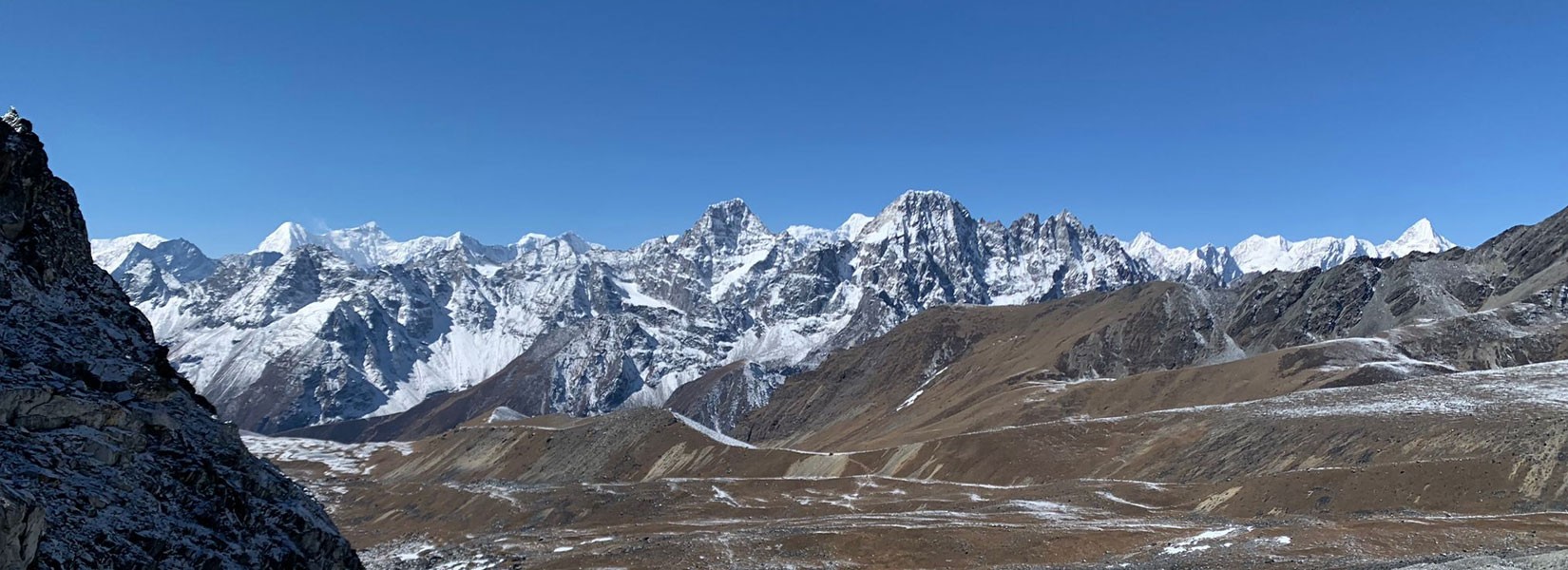




.jpg)
